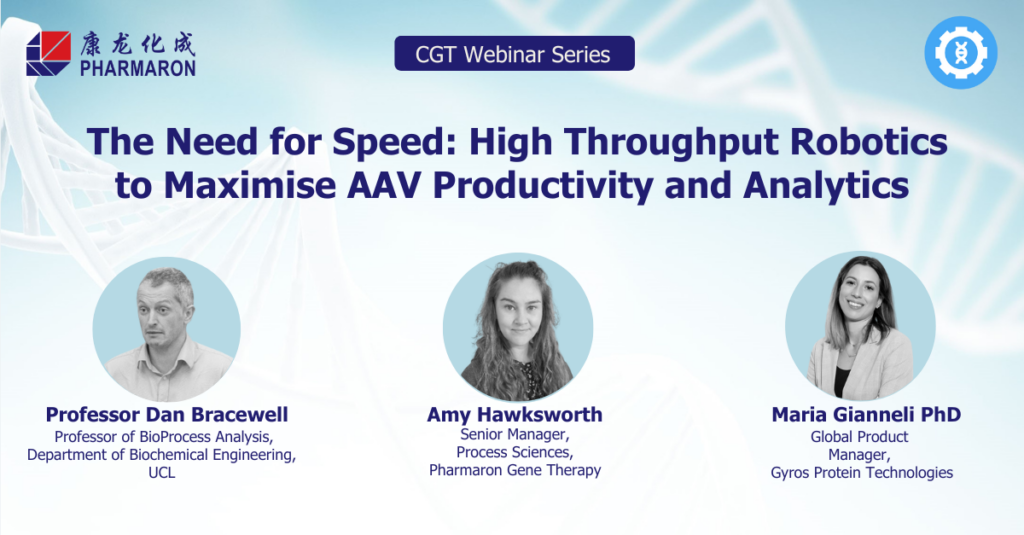
The Need for Speed: High Throughput Robotics to Maximise AAV Productivity and Analytics
Recorded: October 2022
This webinar will discuss the move towards high throughput systems within process development and analytical development to drastically reduce CMC development timelines, maximise productivity and drive results.
Key Messages:
- The importance of small scale HTP USP and DSP systems, to assess a product’s fit to a platform process with high speed and accuracy
- The use of Ambr15/250 bioreactor systems to reduce cost, space and resource compared to a laboratory scale run
- The use of a HTP downstream robotics platform to allow rapid screening of multiple parameters for a highly optimized purification process
- The use of fully integrated HTP analytics which are essential to meet the outputs of a HTP process development approach
- The use of a targeted HTP approach to development to drastically reduce CMC development timelines, maximise productivity and drive results
Agenda:
- Introduction to HTP systems
- What are HTP systems, what is HTPD and what are HTP analytics?
- Current challenges and bottlenecks of low throughput systems
- Benefits of HTP systems
- Specifics for use in Gene Therapy
- Pharmaron’s HTP capabilities
- Introduction to Pharmaron’s development pathway
- Use of HTP systems to optimise upstream development
- Use of HTP systems to optimise cell line development
- Use of HTP systems to optimise downstream development
- Use of HTP systems to reduce analytical bottlenecks
- Introduction of a tiered testing approach at Pharmaron
- High-throughput, automated analysis of viral vector titre and process-related impurities with Gyrolab®
- Collaborative work between Gyros and Pharmaron to develop a HTP titre method for AAV analysis
- Support by Pharmaron for beta testing the AAVX and AAV9 titre kits
Moderated by:
Chris Sadler - Director, Process Sciences at Pharmaron Gene Therapy
Presenters:
Professor Dan Bracewell - Professor of BioProcess Analysis, Department of Biochemical Engineering at University College London
Daniel G. Bracewell is Professor of Bioprocess Analysis at the UCL Department of Biochemical Engineering. He has made major contributions to the fundamental understanding of biopharmaceutical purification operations, including collaborations with Thailand, India and the USA. He has authored more than 100 peer reviewed journal articles in the area to date and currently supervises 15 doctoral and postdoctoral projects, many of these studies are in collaboration with industry. One such project was the basis from which the spinout Puridify a nanofibre absorption technology company now owned by Cytiva was created. He is also academic lead for the UCL-Pall Biotech Centre of Excellence.
Amy Hawksworth - Senior Manager, Process Sciences at Pharmaron Gene Therapy
Amy Hawksworth works as a Senior Manager in Process Sciences at the Pharmaron Liverpool Gene Therapy site where she manages both upstream and downstream processing for external client projects and also internal Process Development projects. Amy has a BSc in Cellular Biology from the University of Manchester and over 13 years industrial experience. Amy started her career in cancer research working on estrogen and androgen receptor down-regulators, screening 100s of small molecules using HTS tools. In previous roles working for AstraZeneca and MedImmune, Amy worked in process development and manufacture of the intra-nasal seasonal Flu vaccine and was also involved in technology transfer and Quality Control activities. She has worked across both upstream and downstream disciplines and loves to see products go from development to the clinic to help improve patients lives.
Collaborating Presenter: Dr Maria Gianneli, Global Product Manager at Gyros Protein Technologies
Maria Gianneli joined Gyros in 2019, working as a Field Application Specialist responsible for application support and training of Gyrolab users in Europe. She then moved to the position of Product Manager for Consumables working to ensure we create products that help customers in every step of the bio pharmaceutical development process. Maria has several years of experience in different roles, supporting customers globally across multiple scientific fields such as immunoassays, biochemical and cell-based assays, affinity and kinetics characterisation. She holds a MSc in cell mechanics and a PhD in materials science and has worked as a post-doctoral fellow in biosensor/lab on chip development.